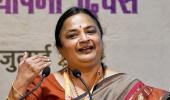'I think I have a better DNA than the Left'

With the appearance of rival political outfits, the Left in the Jawaharlal Nehru University has weakened and is forced to join hands since it struggles to win elections independently, varsity Vice-Chancellor Santishree D Pandit said.
Pandit, a former JNU student, said she used to contest against the Left as part of the Free Thinkers group – a "neutral" students' body not affiliated to any political party.
In an interview with PTI editors at the agency's headquarters, Pandit said nearly 1,500 NOTA votes were cast in the recently held JNU Students Union elections, an act that shows students are interested in neither the Left nor the Right.
Pandit, who did her MPhil and then PhD in International Politics from JNU, said with time more political outfits like the Rashtriya Swayamsevak Sangh-affiliated Akhil Bharatiya Vidyarthi Parishad and Congress-backed National Students' Union of India, as well as Rashtriya Janata Dal, have made their presence on campus, which once used to be solely dominated by the Left outfits.
The United Left panel comprising All India Students Association (AISA), Democratic Students' Federation (DSF), Students' Federation of India (SFI) and the All India Students' Federation (AISF) in March swept in the JNUSU election jointly with BAPSA for the first time in history, defeating its nearest rival the Akhil Bharatiya Vidyarthi Parishad.
The Left had fought the elections together and had to support the BAPSA candidate at the last moment to prevent the ABVP from coming to power.
"There is a weakening of the Left on campus. Earlier SFI, AISF stood independently. They didn't need any alliance to win elections. They could defeat any grouping. I was a Free Thinker at that time. We didn't have both ABVP and NSUI on campus.
"Now their presence, including RJD's, has come up and the Left needs to have unity of 10-12 groups to win," Pandit said.
"The general secretary in the JNUSU was not a Left candidate. She was from BAPSA. The left supported her to stop ABVP from coming in power. She doesn't listen to them, she says they supported me out of their own interest. This shows there is weakening of the Left on campus," she said.
Pandit also said that the number of students represented from different states in JNU has significantly changed and those coming from the South have considerably gone down.
"Although the number of students has gone up, we were only 3,000 at that time, now we are 10,000. Earlier all states were better represented. Now the highest comes from Bihar, followed by Odisha and UP. Students from Rajasthan and Haryana have also increased. However, the number of students from the South has gone down considerably," she said.
Asked if it is hard being objective in the Left-dominated campus given her RSS affiliation, Pandit said she has better leftist credentials than those on campus.
"I think everybody can have personal leanings and we can agree to disagree. That's the beauty of India. Also that way if you see I was born in Leningrad (now Saint Petersburg). I think I have a better DNA than the Left. My god parents were CPI stalwarts …," she said.
Asked if she is liked and accepted as a "Sanghi VC" in the Left bastion, Pandit claimed "Yes, because they think people like me can also be there in the Sangh who have a broader, more flexible and inclusive view."
She added, "I think the Left likes you when you are honest. I have never hidden my affiliation with the RSS. I am a proud Sanghi VC who brought the highest QS rankings to JNU."
Pandit denied there has been any decline in the democratic culture of the university since she took over.
"I don't agree that there's a decline in freedom on campus. If that was so I wouldn't have conducted elections. We even held teachers' union elections. I think the ecosystem (Left dominance) that was there earlier is being contested by other arrangements (presence of new political outfits) on campus now," she said.
Responding to why the varsity thought imposing stringent measures to curb protests on campus was required, Pandit said the move was aimed at maintaining discipline.
"When you are studying on the taxpayers' money, the taxpayers are going to question what type of products I am bringing out. So students have to be critical but factually critical. You can just brand and bring down anybody. We have set the areas of discipline. They can still protest on the Sabarmati lawns," she said.
Recalling her student days, Pandit said, "During my period the top Left leaders were nationalists. We are just telling students to be responsible. You can't say anything and everything. JNU creates two illusions – that everything is free and talk whatever you want and there is no consequence -- both of which do not exist outside the gate of JNU."
Pandit, who came to JNU for the first time with "two plates and a ribbon" said the campus was nothing like she had seen before. "It was an eye opener for me just like many others who haven't seen urban spaces in their life. The government should fund more universities like JNU at state level."
The Left outfits have been at the helm of affairs in JNU almost right from 1969 when the campus was established.
The ABVP, currently the single largest opposition students' body on campus, had for a long time a negligible presence, barring a few electoral wins.
Its star rose in 2015, when ABVP bagged a seat in the central panel of JNUSU, a year after the Modi government came to power.











 © 2025
© 2025